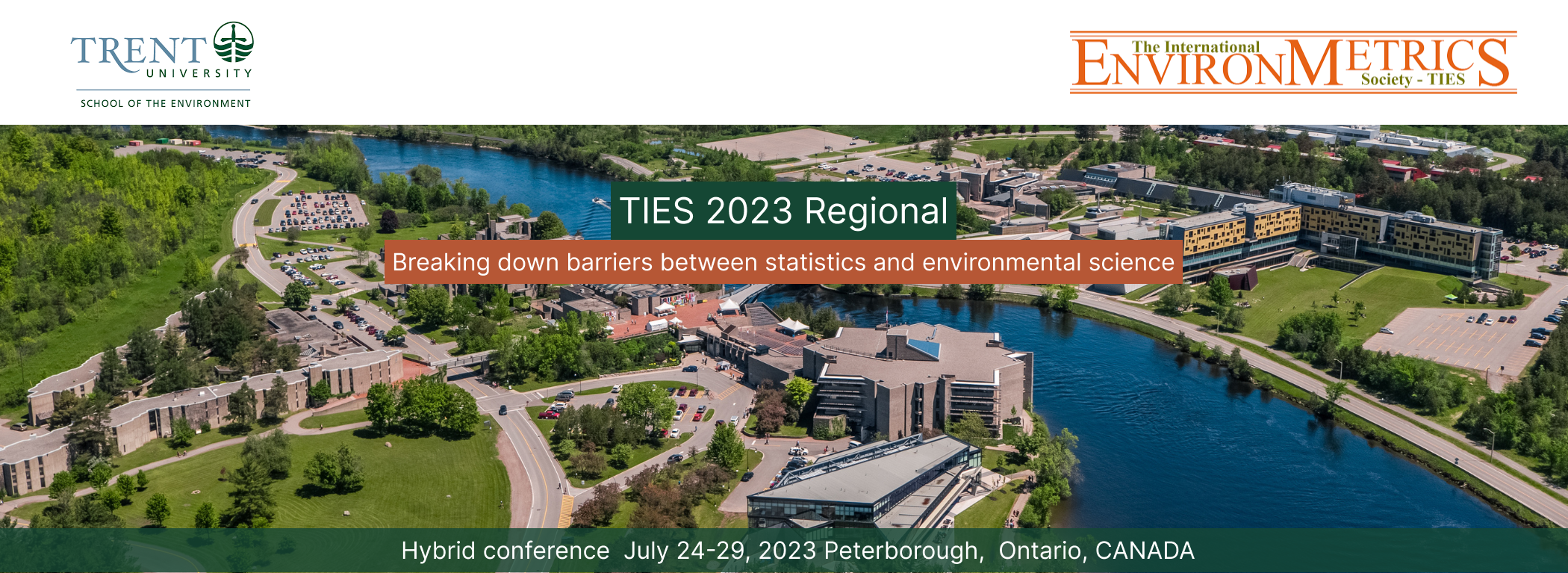Conference Theme
Environmetrics is the application and study of statistics centered on the environment. Recent growth in data science has reinforced that the key
skills of data science are integral to reproducible, replicable workflows in the scientific work already being done by researchers and practitioners
in environmetrics. This year's theme is Breaking Down Barriers between Statistics and Environmental Science, and
the co-sponsorship of this meeting by the Canadian Environmental Modeling Centre and the Trent School of the Environment is hoped to bring a
broad cross-section of environmental modelers to the meeting who would normally not have considered it as a destination. We hope the meeting of
minds between statisticians, environmental data scientists, environmental scientists, and environmental modelers will be very fruitful,
and spark numerous collaborations in the future.
Three plenary addresses have been finalized: Dr. Christy Caudill,
Dr. Nick Hayes and
Dr. Abhirup Datta.
Within the overall theme we will focus on the following topics:
- Topic 1: Climate, climate change, and climate systems
Climate change is an ever-present topic at our meetings. In addition, a broad cross-section of environmental science is interested
in problems connecting to climate systems and climate change.
- Topic 2: Integrative data analysis
Integrative data analysis is the pooling of two or more independent data sets for analysis. Ecological and environmental data are
often recorded at wildly differing temporal and spatial scales, and the tools and methods for working with these data types
are complex and multifaceted. We hope to see talks in this topic from both the side of the environmental data gatherers,
and from the environmental data modelers.
- Topic 3: Spatial and spatio-temporal modeling, statistics, and data governance
Spatial data, spatio-temporal data, and the mathematical and statistical models that deal with their complexities. Also issues of
data governance at large scales, to deal with the massive data sets that can result.
- Topic 4: Ecological modeling
Ecological data and modeling, from surface to sea depths. Models for animal population movement, fisheries stocks, and
other connected areas. Ecological transport models and habitat.
- Topic 5: Air Pollution Measuring, Monitoring, Modeling and Impacts
Air pollution in its multitudinous forms, from particulate matter to carbon dioxide. Connections with remote sensing,
and integrative data analysis. Questions of policy, from monitoring to impact measurement, including epidemiological
applications.
- Topic 6: Environmental data science
Tool building, software development, workflow, processes for building, analyzing and integrating data. Hopeful connections to the
recent pair of Special Issues on Environmental Data Science in Environmetrics.
- Call for Papers (PDF)
- Invited Session Proposal Template (docx)
- Contributed Paper Abstract Template and Details (docx)
Key Dates
-
25 January 2023 - Proposed contributed session abstract submission period opens
-
17 March 202321 April 2023 - Deadline to submit contributed session abstracts and invited session proposals
-
10 April 20238 May 2023 - Notification of acceptance
- 15 July 2023 - Refereed paper submission opens
- 1 September 2023 - Refereed proceedings paper submissions close
|
|
|
